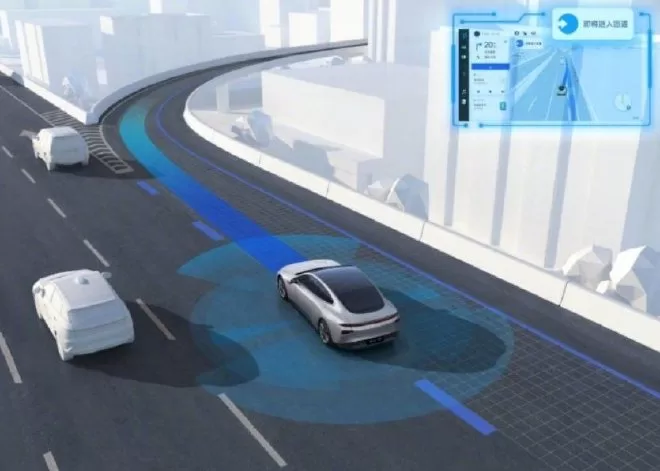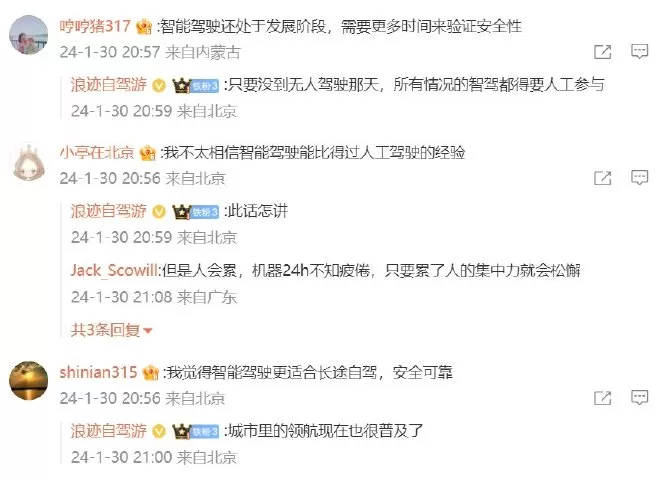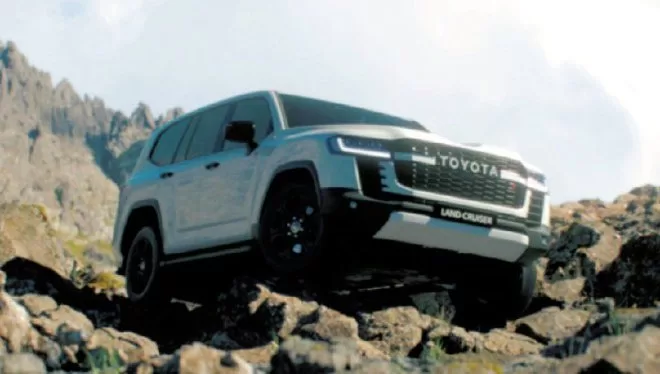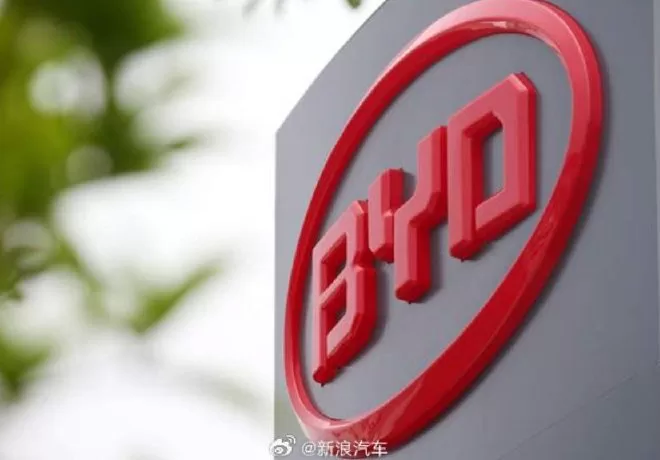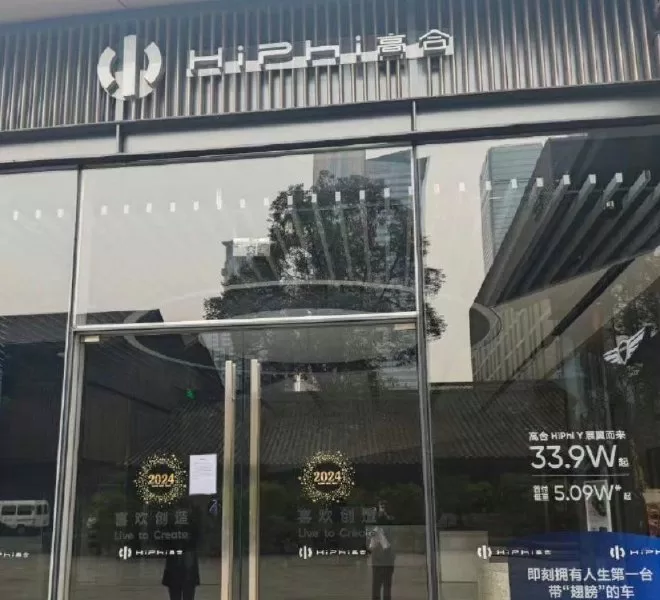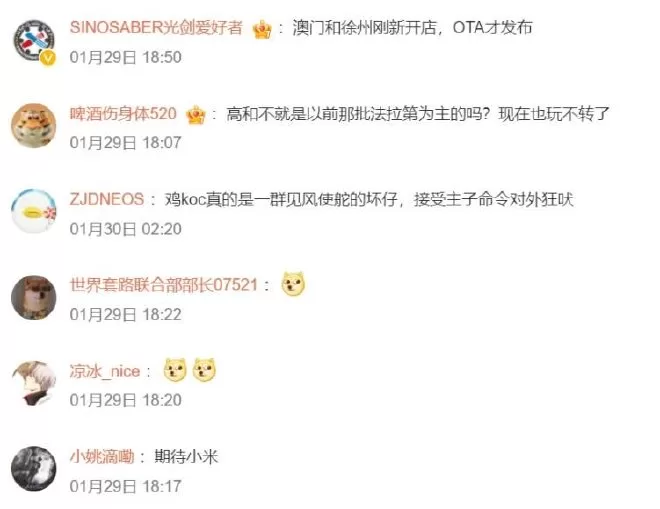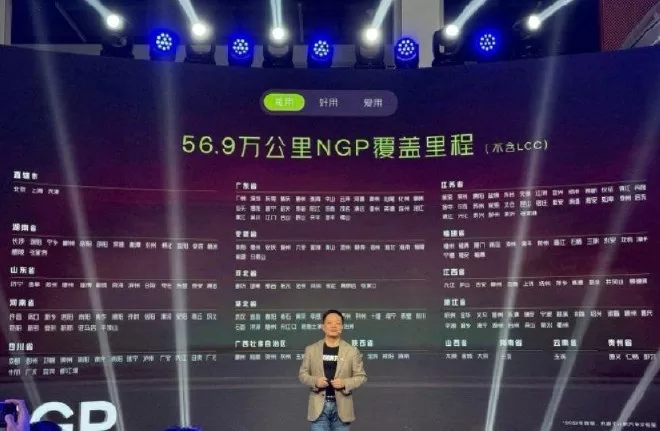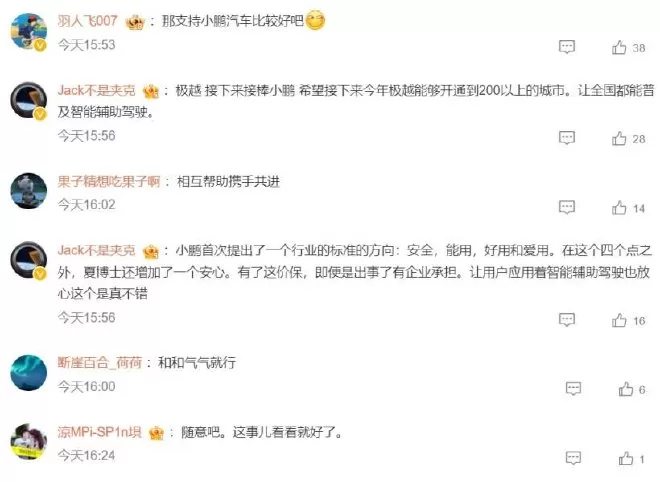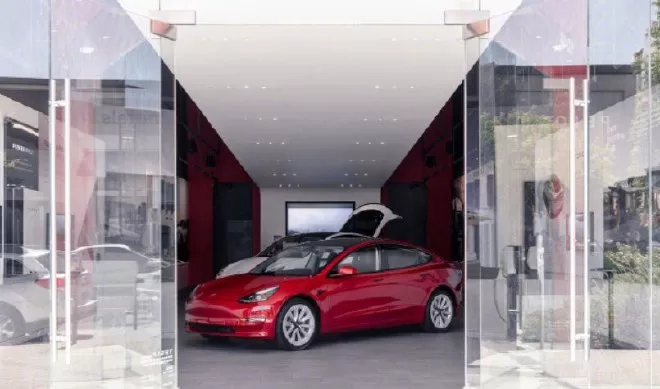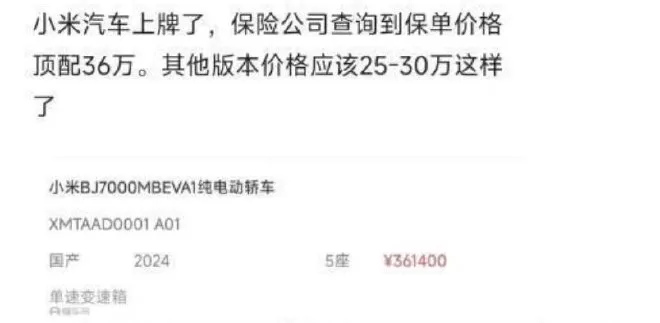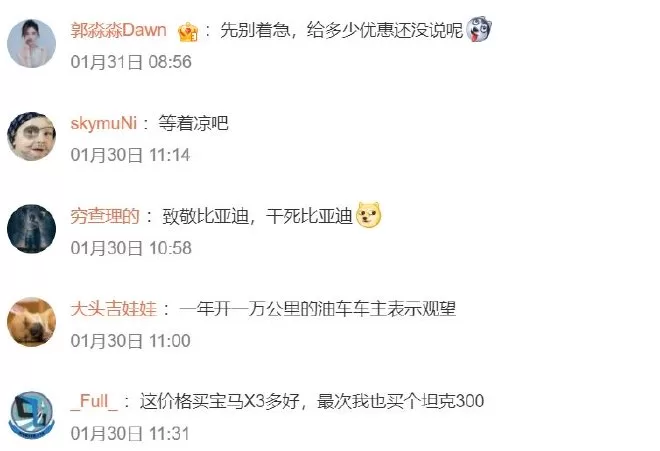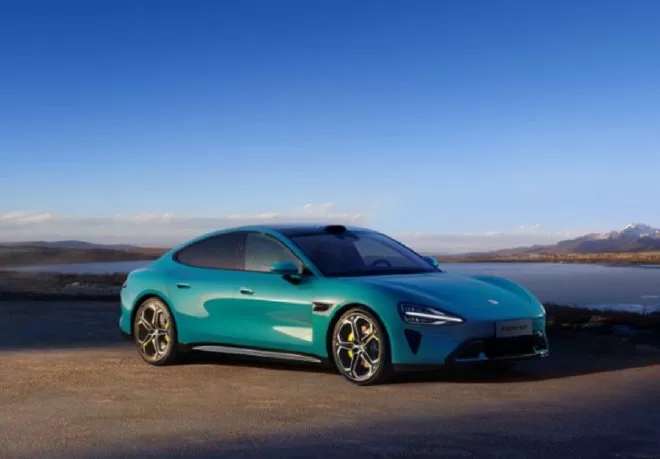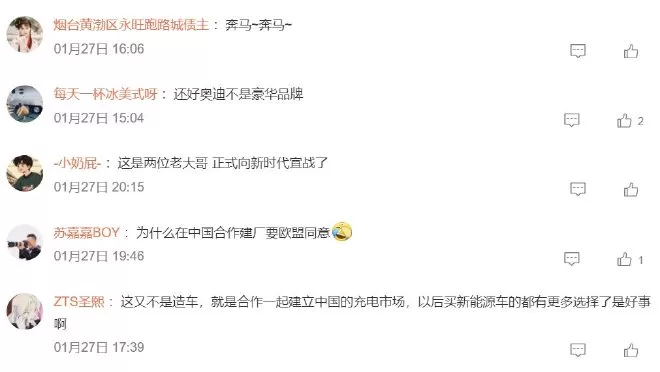Recently, data from Xiaopeng Motors Laboratory in 2023 shows that the accident rate for autonomous driving is only one-tenth of that for human driving. The topic of which is more reliable, autonomous driving or human driving, has once again sparked heated debate. Toyota has once again been caught up in engine emissions testing violations, raising questions about the foundation of Toyota’s reputation. Tesla has issued another recall of 200,000 vehicles in the North American market, with software problems once again becoming a “major concern.” Xiaomi’s cars have been registered in multiple locations, and insurance companies have revealed the price of registration insurance policies. Will this be the final pricing for Xiaomi’s cars? Let’s take a look back at this week’s hot topics in the automotive industry on Weibo. #He Xiaopeng claims autonomous driving is 10 times safer than human driving#
At the Smart Driving Chinese New Year launch event on January 30th, @He Xiaopeng mentioned that according to the data from Xiaopeng Lab in 2023, the accident rate of smart driving is only one-tenth of that of manual driving.
It can be said for sure that this is a topic worth discussing. In simpler terms, everyone is looking forward to autonomous driving being as smooth and anxiety-free as having an experienced driver. As electric cars enter 2024, intelligent driving is undoubtedly the focus of future competition, in addition to inherent parameters such as range, energy replenishment, and safety. From the current stage of development, regardless of the level of intelligence reached by autonomous driving, there still needs to be a driver to operate it, or to take over at any time. In addition to the technological aspect, there are also legal constraints. The key question mentioned in the replies of netizens is, if autonomous driving is already so mature, why do people still need to drive? This includes the hierarchical division of responsibility and importance. At least at the current stage, intelligent driving is a perfect complement to human driving and effectively enhances it, to a large extent making up for the shortcomings of human driving, such as fatigue, distraction, and possessing strong evolutionary and upgrade capabilities. According to this logic, human driving still carries the highest weight, because it involves responsibility. Once an accident occurs, one cannot absolve oneself of responsibility just because it is autonomous driving. Similarly, technology also has its limitations. In complex road conditions, the performance of autonomous driving still depends to a large extent on human driving. In fact, the debate over who is safer, autonomous driving or human driving, has been going on for a long time. Some people believe that machines are always imperfect, and once they lose control or malfunction, the consequences are more serious. Others believe that human driving is not as reliable as autonomous driving, and is not as stable, nor as perceptive of the environment as machines. Congratulations to Xiaopeng Motors for the achievements in autonomous driving. Currently, Xiaopeng Motors’ XNGP urban navigation assistance driving capability has expanded to cover 243 cities, with the highest number of open cities for advanced intelligent driving, and a 94.7% penetration rate for highway intelligent driving, as well as an 83.2% penetration rate for urban intelligent driving. In the most crucial aspect of safety, it is believed that future autonomous driving will become more mature and reliable.
According to reports, on January 29, Toyota Motor Corporation’s Toyota Industries Corporation admitted that there were irregularities in the fuel engine tests conducted by the company. On the same day, Toyota Group stopped the supply of 10 models including Land Cruiser. President Hirokazu Ito of Toyota Industries Corporation apologized at a press conference.
In the midst of overwhelming news about electrification, the news about internal combustion engines is mostly found in the distant past of large-displacement engines, mostly for nostalgia and mourning the past. When Toyota’s violation of engine testing was exposed again, netizens’ reactions confirmed that Toyota’s move is out of tune with the current trend. Toyota’s models have always been known for their durability and adaptability. Many experienced drivers see Toyota cars as synonymous with indestructibility. After this incident, how much faith do consumers still have in Toyota? Because this is not the first time Toyota has been caught cheating and violating regulations during testing, this could potentially damage Toyota’s reputation in the long run. Toyota has many popular models worldwide, such as the Corolla and the LC series. These models are also well-known in China. Has the Chinese market been affected by this incident? It is currently unclear. After half a year of investigation, the special investigation committee revealed that the number of violations in industrial engines has increased from the initial 4 to 11, affecting a total of 233,000 vehicles. In addition, 3 newly discovered diesel engines developed by Toyota also exhibited violations, and these engines are used in Toyota, Hino, and other brand models. On the same day, the Toyota Group also suspended the supply of 10 models, including the Land Cruiser.
Toyota’s automatic loom announced the investigation report on January 29 and held a press conference in Tokyo, where President Ito Koichi bowed and apologized. The company believes that “the lack of management awareness of compliance with laws and regulations,” “lack of independent thinking,” and “lack of compliance awareness” are the main reasons for its violation. #BYD announces 2023 performance forecast#
On January 29, BYD released its 2023 annual performance forecast, expecting a net profit attributable to shareholders of 29 billion to 31 billion yuan, a year-on-year increase of 74.46% to 86.49%; and a non-net profit of 27.4 billion to 29.7 billion yuan, a year-on-year increase of 75.22% to 89.92%.
When talking about BYD’s current performance report, it is more appropriate to rewind time. Since the announcement of the comprehensive cessation of production and sales of fuel vehicles in 2022, BYD’s overall performance has shown a significant upward trend. “Letting go” has brought greater room for development to BYD. Although there is competition from new forces such as We Xiaoli in the car-making industry, they still have difficulty matching the scale when confronting traditional car companies. Similarly, the rapid layout of new energy products allows BYD to quickly launch products for various segmented markets. Without the “lingering” of fuel vehicles, BYD’s development is more about being nimble. Comparing the net profit and non-recurring net profit at that time were 16.62 billion yuan and 15.64 billion yuan respectively, and in 2023, under the first complete year of BYD’s multi-brand simultaneous efforts, overseas strategy achievement, and industrial chain cost control, achieving such operating performance has become a matter of course.
From the perspective of market sales, BYD sold about 3.024 million vehicles in the whole year of 2023, a year-on-year increase of 61.9%, exceeding the original target of 3 million vehicles. In terms of composition, BYD Group has formed a matrix of four major brands, including BYD, Tang, Denza, and Yuanwang. Looking back, BYD’s high-speed growth in performance has also become a driving force for its layout in the new energy field, and will continue to solidify its leading position in the domestic new energy market. In 2024, BYD has set a higher sales target for itself, surpassing 4 million vehicles. Can BYD achieve this?
Recently, there was news of Gaohe’s store closure online. The notice of closure at the Nali Plaza in Chengdu was shown in the picture. In terms of sales, Gaohe’s three models have not even sold 10,000 cars in the past year.
Since the second half of 2023, Gaohe Auto has been plagued by negative news. Despite the official positive responses to various unfavorable news, consumers’ favorability and trust in Gaohe Auto seem to have weakened. With poor sales, continuous negative news, and tight financial pressure, the future development of Gaohe Auto is in question. The cumulative sales volume from 2021 to 2022 was only 4237 and 4520 units, and from January to November 2023, the cumulative sales volume was only 4265 units. These sales figures are far below Gaohe Auto’s original expectations. In addition, the delayed investment of 21 billion Saudi riyals from the Saudi Investment Department and Huaren Yuntong has not been received, and there has been no public announcement regarding this fund. If Gaohe Auto cannot solve the current problems, especially in sales, it is foreseeable that the difficulties will continue in the more competitive 2024.
Xia Yiping, CEO of Xpeng Motors, and He Xiaopeng, Chairman of Xpeng Motors, engaged in a remote dialogue about the mentality of intelligent driving research and development. Xia Yiping pointed out that He Xiaopeng first proposed the industry standard of safety, usability, user-friendliness, and desirability, and he also added an additional key element: peace of mind. He Xiaopeng responded, thanking Xia Yiping for his insights and looking forward to the future development of electric vehicles together.
The focus returns to the level of intelligent driving, and the addition of the element of peace of mind seems more “subjective.” To experience this peace of mind, many aspects must be done well in advance, such as continuous upgrading and maturation of technology; enabling consumers to understand the fundamentals of smart driving. This is the prerequisite for making smart driving “peace of mind.” Once the logic is clear, it is not difficult to see that Xiaopeng is also constantly striving in the direction of smart driving, from being able to use to being easy to use, and then to liking to use. Gradual progression increases user stickiness, gradually improves penetration rate, and the higher safety of smart driving mentioned earlier makes it easier for consumers to understand the essence of smart driving, and “peace of mind” is not far away. The competition in smart driving in 2024 will definitely be more intense, and there will certainly be new technologies emerging. In this big environment, companies will definitely not be complacent, nor will they think they are already dominant. The main theme is still mutual learning and mutual assistance. The market has always been inclusive, but it will also eliminate companies that lack vision and are unwilling to cooperate with others. Mutual blackening will definitely have no future, and working together to expand the market and achieve win-win results is the most correct choice. #Tesla will recall nearly 200,000 vehicles in the United States#
The National Highway Traffic Safety Administration announced that Tesla will recall nearly 200,000 vehicles in the United States due to “unstable software” causing the rearview camera images to not display.
As the “top player” in new energy vehicles, Tesla’s recall has drawn the attention of global consumers. Although this recall is only in the US market, Chinese netizens on the other side of the ocean have also expressed enough concern. Many people have given the first reply of safety, which is indeed what a new energy vehicle should do. Safety is the cornerstone and also the reputation. Tesla’s recalls are usually resolved through software OTA upgrades, not large-scale vehicle recalls. This was also the case in previous large-scale recalls. As a new energy vehicle, Tesla’s various intelligent software has become a “high-risk area” for recalls. This inevitably leads people to think about what defines the good and bad of a pure electric vehicle today. Is it the range, recharging speed, high safety, and extraordinary intelligent driving performance? These are all correct, but what should be paid more attention to is the software. If the traditional mechanical parts are compared to limbs, the software can be seen as the brain. The mind must remain clear at all times and cannot have problems or go on strike. Otherwise, even the most advanced limbs will become decorations. This recall is because unstable software may cause the rearview camera image to not display. Affected vehicles may have the rearview camera not working properly in specific situations, thus not providing the necessary rear view for the driver, increasing the driving risk. Looking back, on December 13, 2023, the US National Highway Traffic Safety Administration website disclosed that Tesla announced the recall of over 2.03 million vehicles due to the insufficient ability of the automatic driving control system to prevent misuse. NHTSA has been investigating the safety of Tesla’s driving assistance system for a long time, and its purpose is to make vehicles safer.
On January 30th, a leaked photo surfaced online, showing a Xiaomi pure electric car with the model number BJ7000MBEVA1 that has been successfully registered and the insurance cost displayed as 361,400 yuan (50250$) for the top configuration.
Do you think this is the final selling price of Xiaomi cars? It’s too early to draw a conclusion. The exposure of the registration price does not mean it is the actual price. Xiaomi officials have responded that “the price is only for one part of the process, not the final selling price.”
Just think about it, how could Xiaomi’s car, which has already aroused the interest of consumers and other competitors, present its price to the public in such a hasty way before its official release? The topic of Xiaomi car prices has been hotly debated, and the marketing tactics of Xiaomi cars are indeed impressive, maintaining suspense until the end and releasing related news at key times to keep the heat. Although not the final basis, the price for registration will not be randomly fabricated. At least it indicates a certain range, which allows consumers to speculate better. As Lei Jun said, “This pricing is really a bit expensive.” If Xiaomi’s high-end car really sells for 360,000 yuan (50050$), do you think this price is high or low? #Joint venture of BMW and Mercedes-Benz approved#
On January 24th, the European Commission announced the approval of the joint venture between Mercedes-Benz and Huachen BMW under the EU Merger Regulation. The deal mainly involves the market for public charging infrastructure for electric vehicles in China. The conclusion of the European Commission is that the transaction will not raise competition concerns, given its limited impact on the European Economic Area.
New energy vehicles are rapidly developing worldwide, with increasing popularity and penetration. At the same time, the demand for charging facilities is also on the rise. In this environment, the collaboration between Mercedes-Benz and BMW to establish a super charging network in the Chinese market is undoubtedly beneficial for both companies and consumers. This collaboration can also be seen as inevitable development. The importance of charging stations as infrastructure is self-evident, and the role of super charging stations as a future focus is becoming increasingly prominent. Building a wider and more efficient super charging network is an urgent need for the development of the new energy vehicle industry. This will further improve consumer perception of electric vehicles and drive further expansion of the new energy vehicle market. From another perspective, the collaboration between Mercedes-Benz and BMW can also be seen as a way to stay warm in the Chinese market. The competition for new energy vehicles in the Chinese market is among the most intense globally. However, the development of their new energy vehicles does not quite match the titles of globally renowned car manufacturers. Facing pressure and competition, the two companies have chosen to cooperate and face the challenge together. It is not advisable to go it alone, as building a super charging network is a high investment, long construction time, and slow return industry. Therefore, the collaboration between Mercedes-Benz and BMW can share resources, reduce costs, accelerate the construction of the super charging network, and achieve profits sooner. In the long run, the benefits outweigh the drawbacks. Standardization and regularization are the strengths of such large companies, which will have profound significance for the Chinese electric vehicle industry.
